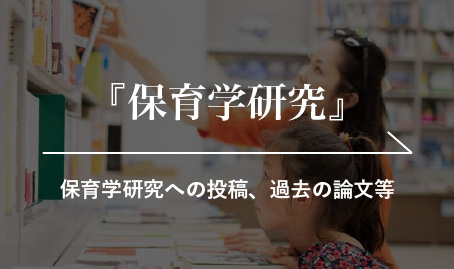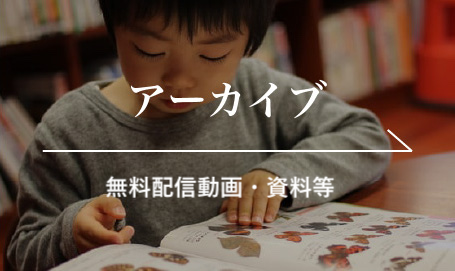< VOLUME 55, No.3>
Sachiko Kitano Professionalism in Early Childhood Care and Education Focusing on Partnership with Parents
Research on Early Childhood Care and Education in Japan, 2017, 55(3), 261-272.
The recent changes in Japanese society and family are thought to be the reason for the increasingly new and complex needs for supporting families. After the year two thousand, it has officially become ECE professionals’ duty to support families in their districts. During this decade, child-rearing-support services in local communities have been widely expanded and now reconceptualization of professional relationships with parents is needed.
This paper considers the regulations, the standards on professional preparation, and ECE evaluation and accreditation materials focusing on ECE professionals’ relationship with families. It also examines the current arguments concerning with family involvement and its effects on children. The research found that ECE professionalism focusing on relationships with families changed from not only supporting but also involving and building partnerships with parents.
Keywords: professionalism, early childhood education, partnership with family
-------------
< VOLUME 55, No.3>
Hiroko Sakagami, Tomomi Kanamaru How Do Mothers Support Their Children’s Transition to Kindergarten?
Research on Early Childhood Care and Education in Japan, 2017, 55(3), 273-284.
Interviews were conducted with mothers to understand their perspectives on their involvement in their children’s early kindergarten adjustment. Mothers whose children cried or expressed some resistance tried to fulfill their children’s needs at home or not to ask them too much about the kindergarten so that they were as relaxed at home as possible, though they were worried about their children while in the kindergartens. As a consequence, mothers were unable to know how their children were doing during the day. Approaches to this dilemma varied according to the amount of information from the kindergarten. This study suggests the importance of a connective loop between families and kindergartens in sharing information about the child, especially during the early stage.
Keywords: entry into kindergarten, experience in transition, mother’s support, cooperation between kindergarten and family
-------------
< VOLUME 55, No.3 >
Yu Ito Using the Parent/Caregiver Contact Notebook to Support Parents of Babies during Weaning
Research on Early Childhood Care and Education in Japan, 2017, 55(3), 285-297.
This study aims to examine how caregivers support parents of babies during weaning. This is done by clarifying how discussions in the parent/caregiver contact notebook about meals impact the parent/caregiver relationship. In analyzing the contents of these notebooks, the aspect that transformed each instance of support and action became clear. Parents and children affected each other while receiving support via the caregiver’s “notebook of messages about meals.” As the relationships between caregivers and parents changed, the notebook’s role also transformed from that of a simple tool for information exchange to a form of support for the child. Furthermore, the notebook represented an opportunity to support parents in other areas of child rearing beyond meals.
Keywords: meals in the parent/caregiver notebook, nursery school, consuming a meal, child care
-------------
< VOLUME 55, No.3>
Kinu Suwa A Study on the Relationship between the Roles of the Family in Relation to That of After-School Childcare and the Its Effects on Children’s Lives :
By analyzing the current state of afterschool childcare facities with short histories
Research on Early Childhood Care and Education in Japan, 2017, 55(3), 298-308.
As the domestic role for the life of the child has been vulnerable on the whole, various social supports for family life have become essential. When we take up the case of children attending school for example, the role of the living rights, developmental rights and the security of the child by learning, play, and provision of basic needs (school meals, etc.) in elementary school is very big. Furthermore, the number of children attending afterschool childcare has exceeded 1 million. In this article, through fieldwork and questionnaire surveys at after-school childcare facilities with a short history, the way in which after-school childcare facilities are going to cooperate with families, schools and areas will be examined. I’ll clarify the specifics using particular cases as examples.
Keywords: children’s life, the domestic role, the relationship between family and after-school childcare, primary school
-------------









